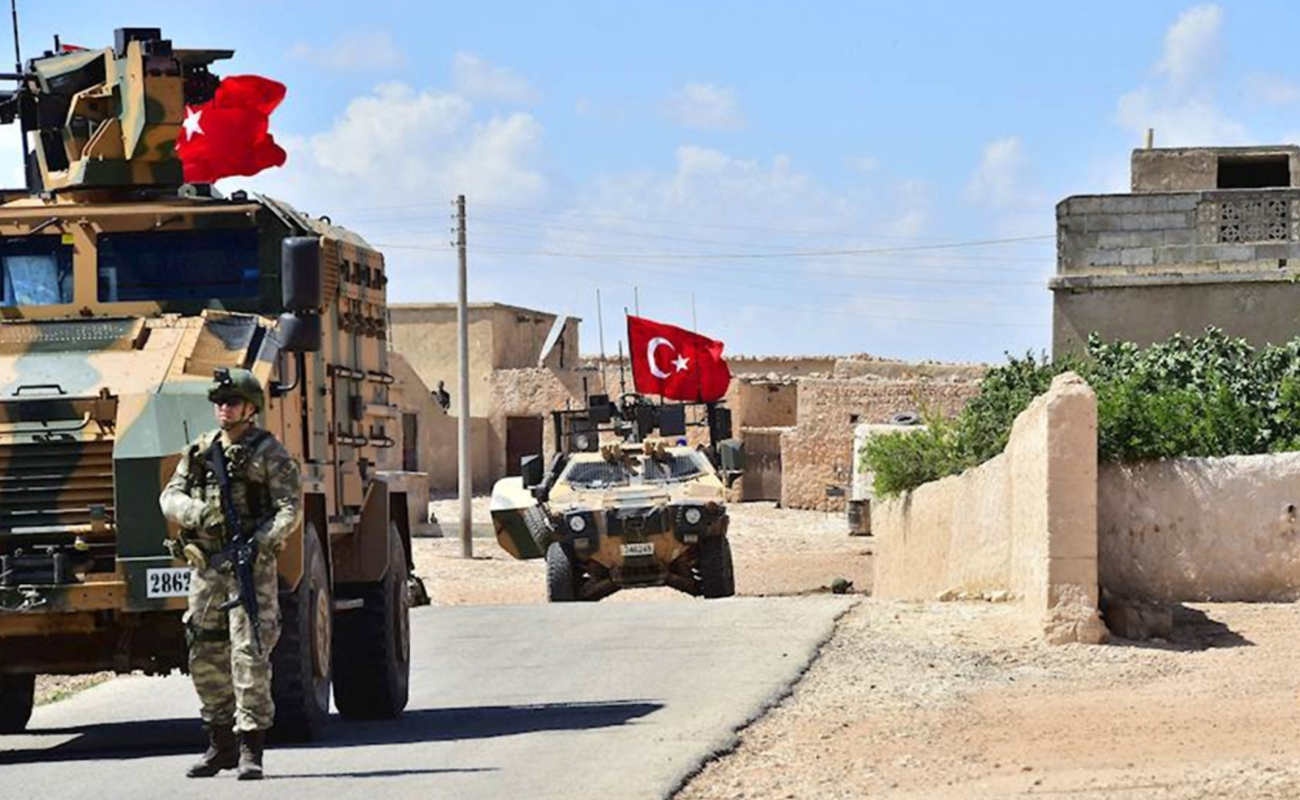Cautious optimism: Syria tiptoes into the future with Turkey’s help
Photo Credit: APF / Turkish military patrols in northern Syria.
By Amb. Omer Onhon
Ankara had a role to play in the fall of the Assad regime, though the full details are yet to emerge. It will have a role in its state-building too, albeit with some big difficulties to overcome first
If unverified reports are to be believed, the operation that toppled the Assad regime in Syria had been in the planning for some time, with Turkey and the United States among the countries involved behind the scenes.
In an interview with the Saudi-based Al Hadath channel, Turkey’s Foreign Minister Hakan Fidan denied working with any country or group to plan the operation. He said Turkey only got involved after Hayat Tahrir al-Sham (HTS) and others launched their assault on Aleppo—and only then to help make it as bloodless as possible.
In the ‘new Syria,’ HTS and the Kurdish YPG (People’s Defence Units) dominate the stage. HTS, which grew out of al-Qaeda/al-Nusra, has dominated Idlib since 2015, and is a designated terrorist organisation, but appears to have developed ties with Turkey, the US, and other Western countries.
In his new guise, HTS leader Ahmed al-Sharaa has emphasised moderation, stressing “the need to shift from a revolutionary mentality to a statist mentality to govern Syria” and “to establish a state based on law and institutions to ensure sustainable stability.”
HTS intends to be heavily involved in the running of Syria after the transition period, and has been trying to create a new image, distancing itself from its past iterations. Time will show whether its deeds match its words.
The Kurdish question
The Syrian National Army (backed by Turkey) and the YPG have taken positions against each other, waiting for the outcome of talks between their negotiators.
Incoming US President Donald Trump, who resumes his seat in the White House in January, has distanced America from Syria, and may order that US support for armed Kurdish groups be withdrawn, so the YPG and others have had to recalibrate.
Trump seems to respect Erdoğan and thinks Turkey holds the key to Syria, but several US Senators have threatened to slap sanctions on Ankara if the YPG is targeted. Yet again, the debate about US support for the Kurds is raging in Washington policy circles.
HTS has been trying to create a new image, distancing itself from its past iterations. Time will show whether its deeds match its words
The YPG has said, to some amazement, that it has been on the side of the Syrian revolution from the start. Its leader Mazlum Abdi also revealed an agreement with HTS that both would keep to 'their' side of the Euphrates River and not attack one another.
Turkish Defense Minister Yaşar Güler said Ankara had no problem with the Kurds in Iraq or Syria, only with the terrorist-designated Kurdistan Workers' Party (PKK) and the YPG, which it accuses of being linked to the PKK. For Turkish leaders, it is impossible to separate the YPG in Syria from the PKK in Turkey.
Güler said the YPG therefore had to dissolve itself and listed Turkey's conditions, such as PKK cadres leaving Syria, and militants of Syrian nationality disarming. He added that these conditions had been communicated to the Americans.

A picture of Bashar al-Assad, damaged by bullets, hangs on the wall of a burnt building of Criminal Security department in Damascus on 20 December 2024.
Competing priorities
Syria's priorities at this stage are numerous. Its new leaders must prevent the collapse of the state, preserve public order, provide for the daily needs of the Syrian people, establish a new political-administrative structure, and disarm the militias.
There are emotional priorities, too. Syrians want to punish the sadists who detained, tortured, and killed tens of thousands in a dark system perhaps best symbolised by the stench, squalor, and shackles of the vast Sednaya prison outside Damascus.
The key will be holding them to account without the search for truth becoming a witch hunt that leads to mass punishments and the wholesale targeting of certain groups such as Alawites, a sect from which the Assad family hailed.
On a more technical level, the formation of the new political-administrative structure in Syria is proceeding, with a caretaker government having been formed, composed of those HTS members who have ruled Idlib for years.
There are no women or representatives from opposition groups and from minorities such as Alawites, Druze, Turkmen, Kurds, and Christians. The caretaker government has a mandate until March, after which the lack of inclusivity is set to be addressed, but there are reasons to want to wait and see.
Elsewhere, a new constitution will be drafted to replace the Assad regime's 2012 version. Before then, decisions about the structure must be made, for instance, whether power will be centralised or devolved (to local councils), and whether it will be a civil constitution or one based on Sharia law.
Economic engine
Down the line, the aim is to hold free and fair elections with multiple genuine candidates, to let the Syrian people choose who will govern them, but reversing Syria's economic decline is arguably the more urgent priority, which will be a major challenge.
The economy shrank by 85% from 2011-23 and the country has been so dramatically damaged by fighting and foreign attacks that the cost of reconstruction is estimated at a staggering $100bn. The international community may provide some financial support, but it will be nowhere near what is needed.

A man waves a Syrian opposition flag at the Citadel of Aleppo in northern Syria on December 11, 2024.
The caretaker government has a mandate until March, after which the lack of inclusivity is set to be addressed
To get itself on an economically sustainable footing, Syria will need to generate its own finances by collecting taxes, attracting foreign investment, manufacturing and exporting goods, and monetizing its natural resources.
Before 2011, Syria pumped around 380,000 barrels of oil per day, but most of its oil fields are now controlled by the YPG, which sells the oil for below-market prices to finance its activities and arms.
For any new Syrian state to replenish the plundered coffers, bringing the oil revenue back to Damascus will be crucial. Lifting the Western sanctions on Syria will also be necessary, but there are political and legal obstacles to overcome first.
Dangers and friends
Among the many dangers facing any new and inclusive Syrian government are the Salafist groups who would seek to impose their strict interpretation of Islam on the political and social life of the country whose impulses are quite different.
Another danger is that the Kurds, Druze, and Alawites could threaten Syria's territorial integrity, and Israel's recent references to protecting minorities in Syria cannot be seen as coincidental. It is not difficult to see how Syria could easily plunge back into chaos and civil war if competing concerns are not managed carefully.
Across the border, Turkey's President Erdoğan has finally delivered a success story on Syria. It has been one of his most difficult files, second only to the Turkish economy. Turkey is currently home to around 3.2 million Syrian refugees and finding a political solution for their safe return was important domestically.
Footage of Turkey's intelligence chief Ibrahim Kalin visiting Damascus, riding through the streets in a car driven by HTS leader Ahmad al-Sharaa and praying at the Umayyad Mosque, may have shown Turkey's weight in Syria. Yet this also raised eyebrows in foreign capitals—and among some Syrians.
Drawing up a future
Foreign Minister Fidan said Kalin went to tell al-Sharaa what had been agreed in talks with regional and Western states, namely that terrorist groups should not be allowed to take advantage of the changes, that minorities should be treated well, and that an inclusive government should be formed, posing no threat to neighbours.
If footage of Turkey's intelligence chief visiting Damascus was intended to show Turkey's weight in Syria, it worked
On 14 December, shortly after Kalin's visit, the Turkish Embassy in Damascus reopened after 12 years. As Turkey's last ambassador to Syria, it was I who closed the embassy back in 2012, when the two states severed diplomatic relations.
In the last two weeks, Turkey has won unprecedented international acclaim for playing a crucial role not just in Syria but in the Horn of Africa, where it mediated an agreement between Ethiopia and Somalia that many think averted war.
Today, it is widely seen as the main non-Syrian actor in Syria, and will help to play a role in the political process, in reconstruction, in preventing any return of radical terrorist groups (such as Islamic State), and by ensuring the safe return of refugees.
There are still many uncertainties and challenges ahead, so caution is advised. If Syria's transition period is not successful, it could quickly fall back into chaos, which will impact Turkey. That is why Ankara is so keen to play a supportive role to achieve an inclusive, sustainable and successful solution in its southern neighbour.
The article was first published in Al Majalla on December 19, 2024.
Ambassador Ömer Önhon graduated from Kingston University’s Department of Economics and served in various positions at the Turkish Ministry of Foreign Affairs since 1985. Önhon, who took on important positions such as the Consulate General of New York and the Embassy of Damascus throughout his career, also served in positions such as the Head of the Middle East Department and the Deputy General Manager of the Middle East.
Academicians and Officials interested to publish their academic pieces on this page, please approach us through: contact@aissonline.org.
The article does not reflect the official opinion of the AISS.

